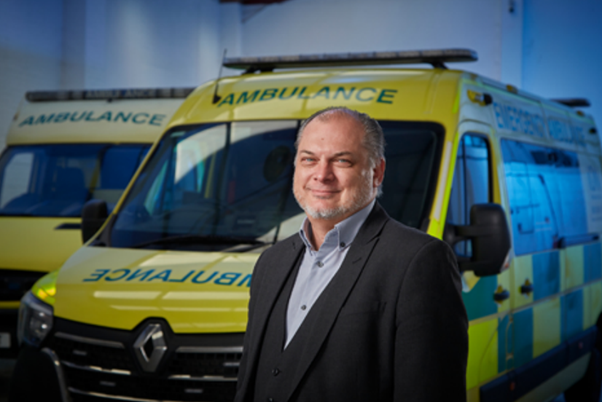“Christmas is a very, very bad time when it comes to mental health. There are so many patients, and they need to be transferred all over the country.”
This was the view of Johan Duplessis, CEO at Ion Ambulance Care, an independent ambulance operator with a national presence, which provides ambulances for everything from neonatal transfers, to NHS 999 calls and specialist bariatric transfers.
He says that for people that need mental health support at this time of year, the ambulance staff can end up having to transfer people 400 or 500 miles to get them admitted into a safe place.
“These are long journeys for us as most of our journeys are 15 to 20 miles. So we see a lot of that over this time of the year, it gets very, very busy.”
For the 180 employees who work across its five sites, the work is demanding, but that is not the only challenge.
Duplessis explains that when he joined the business it was “a turnaround”.
“Ion was going through a very difficult time and because of this staff morale was very low across the board.
“It wasn’t just what’s happening within the NHS, [our teams were] frustrated that when they arrived patients were not ready. Or when they were taking patients to hospitals the beds weren’t ready, so they’d have to return the patients, then have abuse from the staff at the hospital because the patients come back because the other bed at the other hospital wasn’t correct.”
To support the staff and tackle the business challenges, he says the leadership team set out to improve engagement and communication with employees and to provide them with greater support.
Lifeline
Keeping staff well, engaged and at work is important for any employer, but for the people Ion transports, the service can be a lifeline.
Duplessis says that if an employee becomes ill and has to sit for six hours at the GPs, that can mean at least four or five people are not going to reach their outpatient appointment. Those people will have to wait another three months at least before they get the outpatient appointment.
“Everybody’s running at full capacity within the NHS and that includes the transport service. There’s no extra money to have a spare vehicle parked up, so everybody is booked.
“So if somebody goes off sick and doesn’t turn up for a shift and the ambulance can’t go out, there are people that are missing the outpatient appointment.
“These are normally seriously ill patients because they’re the ones that use the transport service.”
He says the business was looking for something that didn’t just provide them with the basic benefits, but a provider that offered the mental health support that they require.
This is why the employer chose Boostworks benefits platform, he says, “because they have the full suite of services”.
The platform offers substantial discounts and a robust wellbeing provision, which goes beyond the basics, providing access to a GP 24/7 helpline, healthcare resources, and exercise videos accessible via a mobile app. This ensures that employees can benefit from these services anytime, anywhere, enhancing their overall quality of life and work satisfaction.
“Staff now have access to online GP service so they can get the help and support they need very quickly, which means they don’t miss the shift, which means we can transport those patients that are desperate to get to their appointments. So it was seen as part of the whole programme to improve morale, but also provide the benefits that the staff need, which they don’t have.”
With many of the staff on the road, online access to benefits and support services was key. The ambulances have Ipads on all the vehicles so they can visit the benefits site. The provider also sends out regular reminders that they have access to these services. Communication about the benefits available is bolstered by the management team and HR.
“People will phone up and ask for part of their wages early because they’re struggling. HR knows that they can point them in the right direction and say, these are all the services you could potentially get.”
He adds that the business made a point of ensuring that the management team were clear on what was available for the staff.
“We used every opportunity, if the staff were doing something or mentioned something, to promote it. Once you get that rolling, the staff start telling each other, because there’s two of them in a vehicle, so if you get 50 percent of my staff to know, 100 percent knows by the next day.”
Duplessis says the biggest thing for him around the GP services is that the employer has seen a drop in short term sickness.
The number of staff occupational health referrals has also fallen because the staff are able to gain the access themselves.
He believes this is the first time a private ambulance service has brought a benefits offer like this to the staff.
“In the beginning, that in itself had quite a big impact for us. Across the industry people may be aware that we’ve brought benefits in because even the NHS doesn’t provide these kinds of benefits.”
He says it was quite a big step for Ion to make the decision to spend the money on that, but they have seen the benefits.
Employee numbers are now getting close to 200 because the business is gearing up for a new contract. It also has 60 to 70 subcontractors.
“Our subcontractors want access to this benefit as well, but currently, because it’s a benefit, I can only provide it to the employed staff. So we’re trying to find out if there’s a way to do it,” he says.
“We’re looking at renewing it when it comes up next year. For us, that speaks volumes already.”












